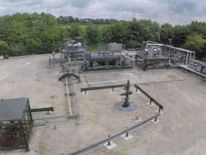handouts of up to £10,000 for homes hit by fracking are being pledged in a major policy shift by Theresa May.
Under a scheme launched by George Osborne last year, councils in areas affected were set to receive payments from the Government.
But now cash will be paid direct to households from a fund which could hand out up to 10% of tax revenues from shale exploration.
In each area affected by fracking, mostly in the north of England, between 500 and 2,000 households would receive a cash payment.
That could total up to £10m per area.
The move is being hailed by ministers and fracking supporters as a generous windfall.
But it has been condemned by opponents as a cynical bribe.
Theresa May said: "The Government I lead will always be driven by the interests of the many - ordinary families for whom life is harder than many people in politics realise.
Fracking involves injecting shale rock with water, sand and chemicals
"As I said on my first night as Prime Minister: when we take the big calls, we'll think not of the powerful but of you.
"This announcement is an example of putting those principles into action. It's about making sure people personally benefit from economic decisions that are taken - not just councils - and putting them back in control over their lives."
The move is also about the cost of energy. When she launched her bid for the Tory leadership last month, Mrs May pledged to tackle what she called "rocketing" energy bills hitting households.
"This announcement is an example of putting those principles into action. It's about making sure people personally benefit from economic decisions that are taken - not just councils - and putting them back in control over their lives."
The move is also about the cost of energy. When she launched her bid for the Tory leadership last month, Mrs May pledged to tackle what she called "rocketing" energy bills hitting households.
There could be as much as 1,300 trillion cubic feet of shale gas under the north of England
"I want to see an energy policy that emphasises the reliability of supply and lower costs for users," she said, barely an hour before her opponent Andrea Leadsom withdrew from the leadership contest and she was elected unopposed.
One of Mrs May's first acts as Prime Minister was to axe the Department for Energy and Climate Change, created by Labour, and move energy into a beefed-up Department for Business, Energy and Industrial Strategy.
Then, last week, the Prime Minister delayed approving the new £18bn Hinkley nuclear power station in Somerset because of concerns over Chinese involvement and about value for money for taxpayers and energy consumers.
Fracking is hugely controversial. It involves drilling deep into the earth and injecting shale rock with a high-pressure mixture of water, sand and chemicals to release the gas inside.
There has been strong opposition to fracking by affected communities
There could be as much as 1,300 trillion cubic feet of shale gas under the north of England, providing more than 500 years of gas supply for the UK.
Supporters claim that post-Brexit, the falling pound makes it more expensive to import gas and boosts the case for a reliable supply of low-cost shale gas. But opponents say it is dangerous, because it requires huge amounts of water, causes pollution and earth tremors.
"Communities across the UK have made it clear that they don't want fracking," said Tony Bosworth of Friends of the Earth.
"A YouGov survey for the Sunday Times last year showed that, even where communities were offered £1m, they still remained opposed to fracking taking place near them.
"Communities won't suddenly be bribed into accepting this unpopular practice, which poses risks to people and the environment."
Greenpeace UK chief scientist Dr Doug Parr said: "The government has tried to sweeten the fracking pill with cash bribes before, and public opposition just kept on growing.
"The simple truth is that people's concerns about climate change and their local environment cannot be bought off with a wad of cash. You can't put a price on the quality of the air you breathe, the water you drink, and the beauty of our countryside.
"If Theresa May wants to show the UK open for business, she should reverse the policies that have harmed our vibrant clean energy sector and back the technologies that can supply cheap, home grown energy for decades to come."





No comments:
Post a Comment